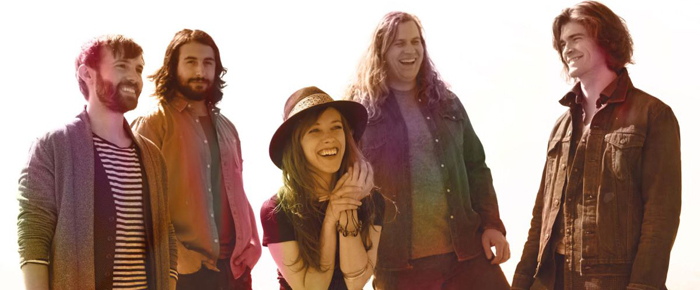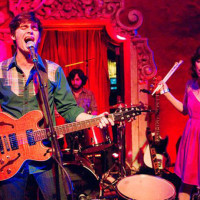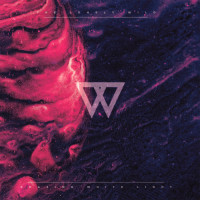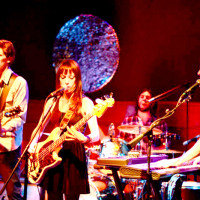
By Eleni P. Austin
The Lonely Wild burst on the scene just two years ago, with their magnificent full-length debut, The Sun As It Comes. Critically lauded, it was one of the best albums of 2013, a wild and wooly ride that defied classification.
The band was the brain child of Andrew Carroll, (vocals, guitar, bass and percussion) and Ryan Ross, (keyboards piano, harpsichord, melodica, bass, trumpet and vocals.) Near the beginning of the 21st century, Carroll moved to Los Angeles to study music and film. He met Ross at school and the pair hit it off. Their first collaboration was the band, You, Me & Iowa.
By 2010, they formed The Lonely Wild. The original line-up also included vocalist Jennifer Talesfore, drummer Edward Cerecedes and guitarist Andrew Schneider. They recorded an EP, Dead End, which was released in 2011. Both Talesfore and Cercedes departed the band. Jessi Williams was recruited to handle vocals, percussion and trumpet and Dave Farina stepped in behind the drum kit.
Their first long-player, The Sun As It Comes arrived in 2013. The music was a stunning panorama of influences, encompassing everything from Neil Young to Ennio Morricone. The erudite lyrics explored issues like the Arab Spring, political corruption, greed, Baby Boomer avarice and addiction.
The L.A. band immediately went on tour, supporting artists like John Doe, Laura Marling, Dwight Yoakam and Damien Rice. They played tiny clubs like the Echo and Pappy & Harriets as well as well-known festivals like SXSW, First City Festival, Jubilee, Cask & Drum Festival and Echo Park Rising in their adopted home town. They criss-crossed the U.S. and made it up to Canada, the home of maple syrup and minimal gun violence.
Now they’re back with their sophomore effort, Chasing White Light. As with The Sun…, all the songs were written by Andrew Carroll. This time out he was heavily influenced by the loss of loved ones and the darker aspects of the human condition. The album opens with the one-two punch of “Snow” and “Hunted.”
Cascading rim-shots and a trumpet fanfare provide an overture to “Snow.” Rollicking guitar riffs ride roughshod over a galloping rhythm. The infectious melody is buoyed by the band’s trademark dissonant harmonies. But scratch beneath the shiny surface and the lyrics are a mordant meditation on life after death; “Somehow I’ve always known the dead are not watching my show/It’s just a lie disguised as hope.”
The specter of death is ever present on the anvil chorus of “Hunted.” Here the vocals veer between breathless and histrionic, while the melody and instrumentation navigate a series of aural switchbacks. Witnessing the end of life, the “fight or flight” instinct kicks in. “Take me with you when you go, don’t want to face the day alone/Don’t wanna lean on desperate faith to carry me through.”
The first song written for the album, “Scar,” is what motivated Carroll to tackle themes of mortality and loss. The track is an accelerated see-saw waltz accented by sweet harpsichord, urgent keys and a stutter-step rhythm. The lyrics reflect back on memories of a long-lost childhood friend who endured hardship and passed away. The tune is suffused with regrets and missed opportunities, “Where was it you had to go, pulling that heavy stone?/Couldn’t we have lightened the load?”
With “Into Their Mouths,” “Free From Harm” and “Funeral” the band is, in the immortal words of Mr. Mojo Risin’ fully “wallowing in the mire.” “Into Their Mouths” is the album’s centerpiece, a Spaghetti Western pastiche anchored by banshee vocals, kinetic time signatures, a swaying string section, mariachi horns and an incendiary guitar solo. The lyrics seem to be the illness actually addressing the body it’s weakening. “I’ll feast on you, devour everything that’s keeping you alive.”
“Free From Harm” is propelled by a Punk-tastic, jackhammer rhythm, keening guitar riffs, along with intertwined violin and cello. The lyrics note that death is compulsory; it’s a part of life. “It’s never time, but we’re bound to our bodies’ slow decline.”
“Funeral” is suitably funereal. Hushed keys and a lone voice are quickly supplanted as a rush of voices and instrumentation enter the fray. The stream-of-conscious lyrics ask the unanswerable questions and channel the deep feeling of ennui and emotional torpor people experience during these rituals. “When all the old folks start to cry, Where is my lover?/And all the young folks hold their breath, What will we stand for? I’m just trying not to close my eyes.”
The best tracks here are “Running” and “Blunt The Blade.” The former shares some of the grandiosity that characterizes the music of DeVotchKa and Sufjan Stevens. Swirling acoustic arpeggios get the ball rolling. Swoony strings and a breakneck beat propel the action. The cryptic lyrics seem to be more about life than death, at times directly addressing god. “Did you write the story, are we actors on the stage?”
The instrumentation on the latter is spare. Cascading acoustic filigrees dovetail with piano grace notes and violin. Carroll’s tenor is buttressed by the band’s ecclesiastic harmonies. It’s a combo-platter that echoes the pastoral beatitude of Nick Drake along with the breath-taking finesse of Tim Buckley.
Other interesting tracks include the two ambient instrumentals, “[Born]” and “[Thrown].” The album concludes with the title track. The melody and instrumentation shares the same spatial elegance as Pink Floyd’s epochal “Us And Them,” but adds ting-ing hi-hat hiccupping rhythm. Aching harmonies and a coruscated guitar solo underscore this aspiration: “All we can hope for really, is to be grateful, is to be necessary, is to be useful.”
As the song draws to a close, Carroll only hopes when his time is nigh he has the opportunity to offer this proper goodbye; “Farewell. I love you honey, Gone chasing that little white light/Gone, swimming in the tiny chemicals that make me feel like I got a tunnel straight to heaven, when I die.” Finally, “Echo” finishes the album with a brief acapella coda.
On their first full-length, The Sun As It Comes, Andrew Carroll and Ryan Ross handled production chores. For the new album they sought the guidance of producer (and fellow musician), John Vanderslice.
Owner of Tiny Telephone Recording Studio, in San Francisco’s Mission District, Vanderslice has produced albums for disparate artists like the Mountain Goats, St. Vincent and Spoon. His studio uses only analog equipment, which Vanderslice has characterized as “sloppy hi-fi.”
For this album, he encouraged the band to eschew their demos, in favor of a live approach. They had access to antique instruments, and recorded directly to tape. The whole record radiates a visceral energy.
Tackling topics of death, loss and redemption may sound like a fat fucking downer, but the bold melodies and piquant instrumentation keep the proceedings lithe and buoyant. Chasing White Light never flounders in a sea of sadness, on the contrary, it offers a cathartic journey the listener will want to take again and again.














































